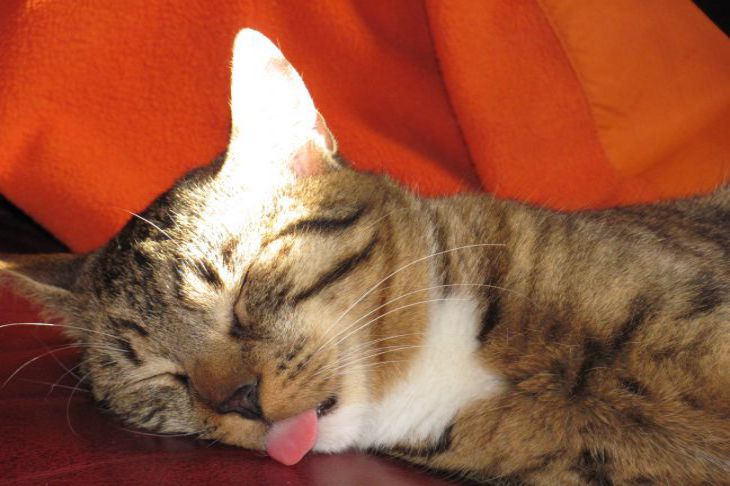Sometimes a cat owner notices that his pet has his tongue hanging out.
It looks funny, but many people start to worry whether everything is okay with the animal. And these fears are justified.
When it's just funny
Healthy cats stick out their tongues for several reasons. Sometimes they simply forget to pull it into their mouths during intense licking. The cat may be distracted by something in the middle of the process, and the tongue will remain sticking out. This sometimes happens to people, too, when a person is deep in thought, the jaw muscles are relaxed, and the tip of the tongue is visible from the slightly open mouth. This phenomenon can often be seen in small children. The same mechanism works in four-legged animals.
Like dogs, cats' tongues are responsible for thermoregulation. But since this animal is less active, it rarely cools down in this way. But if your pet sticks out its tongue in hot weather, you should find it a cooler place and give it water. In extreme heat, there is a high risk of heat stroke.
The tip of the tongue can also be seen in a pet during periods of intense excitement, such as mating. Less often, such a reaction can be seen during hunting. If a cat looks out the window and birds are flying nearby, it can meow and stick out the tip of its tongue from overexcitement.

This phenomenon can also be a consequence of the special structure of the jaw. As a rule, tongues hang out most often in representatives of breeds with a flattened muzzle, for example, Persians.
When is it a danger signal?
Sometimes a protruding tongue is a symptom of a disease.
In case of inflammatory processes in the oral cavity, the animal thus cools the burning wounds and inflamed areas.
If your cat is breathing heavily, it's best to go to the vet. This can be a sign of many illnesses, from a common cold to bronchitis and pneumonia.
Oral oncology is also accompanied by protruding tongue. Additionally, the cat may experience bleeding, redness, and ulcers.
When the jaw is dislocated, you may notice that the animal's mouth does not close, the jaw is in an unnatural state, and salivation is increased.
If the cat not only sticks out its tongue, but also refuses to eat, has convulsions, vomiting, stool disturbances, and changes in behavior, then most likely it is poisoning.
These are far from all the symptoms and diseases that can cause cats to stick out their tongues. Only a doctor can make an accurate diagnosis. If the cat looks healthy and behaves normally, there is no need to worry. But when behavior changes are observed, the pet refuses to eat, drinks a lot of water or, conversely, does not drink, has impaired coordination, dilated pupils or there are any other deviations from the norm, this is a reason to worry and contact a veterinarian.








